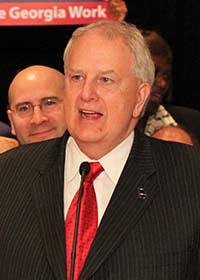By Mark D. Zimmerman


MELVILLE, New York — Georgia’s Fulton County District Attorney Fanni Willis is heading up the criminal trial of Donald Trump and 18 other defendants for conspiring to commit election fraud. Willis herself is being investigated in regard to a personal relationship with her chief investigator, Nathan Wade. During a hearing on that matter, former Georgia Governor Roy Barnes testified that in 2021, Willis had asked him to be a special prosecutor in the Trump case, but he said no. He had already once had to live with private security due to threats against him, and he didn’t want to have to “live with bodyguards for the rest of my life.” Barnes said that in that previous incident, he had assumed at first that the threats were because of his leadership regarding the removal of the Confederate battle emblem from Georgia’s state flag. But he learned from the FBI that those threats against him were because he was “too close to the Jews.” What was Governor Barnes’s connection to Jews that incurred the wrath of some Georgia racists?